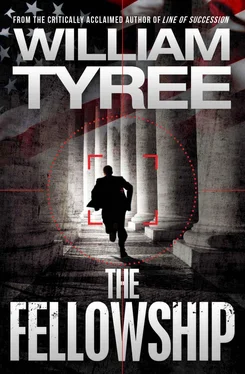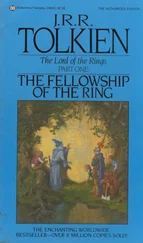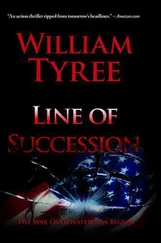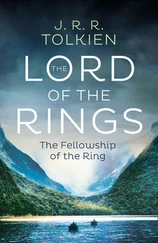William Tyree - The Fellowship
Здесь есть возможность читать онлайн «William Tyree - The Fellowship» весь текст электронной книги совершенно бесплатно (целиком полную версию без сокращений). В некоторых случаях можно слушать аудио, скачать через торрент в формате fb2 и присутствует краткое содержание. Год выпуска: 2013, Издательство: Massive, Жанр: Триллер, на английском языке. Описание произведения, (предисловие) а так же отзывы посетителей доступны на портале библиотеки ЛибКат.
- Название:The Fellowship
- Автор:
- Издательство:Massive
- Жанр:
- Год:2013
- ISBN:нет данных
- Рейтинг книги:5 / 5. Голосов: 1
-
Избранное:Добавить в избранное
- Отзывы:
-
Ваша оценка:
- 100
- 1
- 2
- 3
- 4
- 5
The Fellowship: краткое содержание, описание и аннотация
Предлагаем к чтению аннотацию, описание, краткое содержание или предисловие (зависит от того, что написал сам автор книги «The Fellowship»). Если вы не нашли необходимую информацию о книге — напишите в комментариях, мы постараемся отыскать её.
The Fellowship — читать онлайн бесплатно полную книгу (весь текст) целиком
Ниже представлен текст книги, разбитый по страницам. Система сохранения места последней прочитанной страницы, позволяет с удобством читать онлайн бесплатно книгу «The Fellowship», без необходимости каждый раз заново искать на чём Вы остановились. Поставьте закладку, и сможете в любой момент перейти на страницу, на которой закончили чтение.
Интервал:
Закладка:
Carver decided to see if there was anything of interest on the video from Adrian Zhu’s Sapienza University lecture, which he still had not seen in its entirety. He went to his living room, switched on his computer, and began watching the opening segment. Petro Parisi, the head of Sapienza University’s Faculty of Mathematical, Physical and Natural Studies, stepped onstage holding a microphone. The 63-year-old professor, who wore a slim-cut gray suit complete with a pocket square, made a show of giving Zhu’s hipster outfit a long look.
“I must admit,” Parisi said in English over the microphone. “When I first saw you, and realized how young you are in relation to your scientific achievements, I became rather depressed at my own life.”
Zhu smiled wryly. “Actually, I’ve always wished I’d been born a few decades earlier. Everything was so wide open. For example, sometimes I think about how free it would feel to live in the age before mobile phones. The thought of leaving the house, and having no way for people to contact you. It must have been so liberating.”
“You must be joking,” the professor said. “Imagine you make a date with someone to meet at a restaurant. You show up. They are running very late because of traffic, or the flu, or a tyrannical boss. Meanwhile, you are sitting there drinking wine in anger, thinking they forgot about you. Eventually you leave, having no way of knowing that they are about to arrive. Believe me, this was no golden age.”
Carver fast-forwarded through the rest of the banter and most of the regular presentation, which he had seen from footage of previous appearances at Oxford and Zurich. The Q amp; A period was what he was interested in.
Now he watched as a queue of journalists lined up at a microphone in the center aisle. The first reporter began her question in Italian before Professor Parisi admonished her for straying from English, the official language of the conference. “Mr. Zhu,” she began again in English, “Are the nutritional benefits from the milk of your cloned cows really superior to those of existing milk substitutes?”
“Without question,” Zhu replied. “But to be honest, the challenge of cloning cattle from hair samples, rather than frozen embryos, was a lot more interesting to me than the public benefits of the project.”
A writer from La Repubblica had the honor of asking the next question. “Mr. Zhu, you mentioned something about the milk of the cloned cattle called lysozyme. What is that exactly?”
“A good bacterium,” Zhu said. “It contains proteins and vitamins and other things that help fight off infections and promote growth.”
“Have there been any negative side effects in the children?”
“Nope. Next question, please.”
The journalist remained at the mic, fending off the writer behind her with an elbow. “It’s been rumored that LifeEmberz has actually cloned a human being that has matured beyond the embryo stage. Is there any truth to that rumor?”
The audience let out a collective gasp as they waited to see if Zhu would answer the question. Carver wondered if the journalist had heard the same rumors he had. An American asset in China had reported — without any proof whatsoever — that Zhu had already successfully cloned a child for the most senior officer of the People’s Liberation Army, using mitochondrial DNA from the exhumed corpse of the official’s great-grandfather. The same asset had produced a dubious-looking set of emails in which a senior Communist Party official appeared to ask Zhu to clone Chairman Mao, the grand patriarch of the Communist Revolution, whose body lay perfectly preserved in a Tiananmen Square mausoleum. He implored Zhu to apply his considerable skills to the cause, explaining that his wife would give anything to have children with Mao’s DNA.
Nothing gave Carver the creeps more than the idea of making fertilized eggs from the DNA of a totalitarian who had been on ice for decades. Still, a small part of Carver could understand it. How many Americans mothers would love to carry a baby made from the DNA of Abe Lincoln, John F. Kennedy, Ronald Reagan or Bill Clinton?
Zhu licked his thin lips before speaking. “I’m not at liberty to comment on any research in progress.”
Carver replayed the sound bite and played it again. And again. He called Arunus Roth, who was monitoring the situation from McLean. “Did you watch this Zhu video?” He didn’t wait for Roth’s answer. “Maybe I’m crazy, but I think Zhu just admitted to cloning a human.”
U.S. Capitol Building
Washington D.C.
The hearing room had been fashioned in the style of a classic tribunal. Blake Carver and his attorney sat at a simple table on the hearing room floor. A panel of congressional representatives sat on an elevated panel in front of them. The height differential was designed to make the person testifying feel small and to exaggerate the power and influence of the committee members.
Bolstering the committee members were two additional rows of junior congressmen and their staffers. As Carver surveyed the tired, stressed-out bunch of public servants, he envisioned an equal number of medicine cabinets stocked with Adderall, Ambien and antacid tablets.
Luis Gonzalez, (D-New Mexico), Chairman of the House Permanent Select Committee on Intelligence, peered down from his seat in the front row. Although he sat scarcely 20 feet from his subjects, he switched on his microphone. “Glad to have you with us this morning, Agent Carver.”
Carver, who was dressed in a shark-colored suit with no tie, leaned into the microphone situated on the table. “The feeling is not mutual,” he said to polite laughter.
“It was a battle getting you in here,” Rep. Gonzalez remarked, “So forgive me if we waste little time in getting down to business. This committee is concerned with events taking place 13 months ago. Can you please characterize your professional activities during that time period?”
He looked over his shoulder. Where was Julian? He had promised he would be here. It wasn’t just that Carver wanted him for moral support. Speers had been a district attorney prior to joining the Hatch administration as general counsel, and later as chief of staff. He was imminently more qualified than the rental lawyer he’d sent in his place.
“Agent Carver?”
“The answer is no. I won’t characterize last August.”
Judging by the look on the committee members’ faces, nobody had ever refused to answer a question before. “Excuse me?”
“It’s nothing personal, Congressman. My activities at that time were highly classified in nature, and frankly, above your security clearance.”
The attorney leaned into Carver’s ear and whispered, “There’s no reason to piss these guys off. The administration has your back, but if you create enemies here, God help you.”
Carver turned his head and covered his mouth before whispering — just in case there were any lip readers on the panel. “We just met. You don’t even know me. If you have sound advice of a legal nature, I’ll take it. Otherwise, please let me do the talking.”
Gonzalez cut in. “Agent Carver, we aren’t here to uncover intelligence secrets. To be frank, we’re primarily interested in the release of a federal prisoner named Nico Gold into your custody on August 21 of last year.”
So Julian was right. Of all the ethical lines that had been crossed that day in the name of national security, it figured that the committee would waste Carver’s time with this.
Personally, Carver found Nico Gold obnoxious, manipulative and arrogant. But there was no denying that he had an unparalleled mind. For years nobody knew his real name. He had been the Banksy of the hacking community. He had started as a teenager, lifting tiny sums out of millions of bank accounts in western countries. He would then redistribute the money into the accounts of NGOs in poor African countries. Modern-age Robin Hood stuff. But then he took a big score from the International Monetary Fund, and got a little carried away in flaunting his success.
Читать дальшеИнтервал:
Закладка:
Похожие книги на «The Fellowship»
Представляем Вашему вниманию похожие книги на «The Fellowship» списком для выбора. Мы отобрали схожую по названию и смыслу литературу в надежде предоставить читателям больше вариантов отыскать новые, интересные, ещё непрочитанные произведения.
Обсуждение, отзывы о книге «The Fellowship» и просто собственные мнения читателей. Оставьте ваши комментарии, напишите, что Вы думаете о произведении, его смысле или главных героях. Укажите что конкретно понравилось, а что нет, и почему Вы так считаете.











